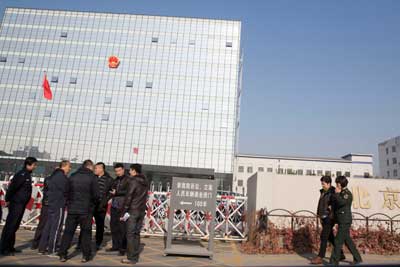Convincing potential sources to share information and publishing independent journalism on social media or with the help of crowd-funding are a few of the practices that are likely to suffer under a pair of new Chinese laws–one passed, one still in draft form–local journalists tell CPJ.
On July 1, the Chinese government announced that it had passed the National Security Law. The legislation’s definition of national security is all-encompassing, covering everything from politics to finance, energy, food, religion, culture, as well as cyberspace and outer space. The wording of the law is such that nearly any activity in Chinese society could be construed as a national security concern.
On the heels of this law came proposed legislation on the Internet. On July 6, the Chinese government released a draft Cybersecurity Law that would give it the authority to further tighten the grip on the flow of information online. The draft law places even more responsibility on companies to enforce the real-name registration of users, censor “prohibited” information, and provide “necessary support and assistance” for police investigations and for “national security reasons.” The law would also grant authorities the legal power to cut Internet access when “fulfilling the need to safeguard national security and social public order” and when responding to emergencies. It stipulates that all user data must be stored in China. The draft law is open for public comment until August 5.
CPJ solicited the opinions of four Chinese journalists about the laws’ potential impact on their work. Citing the sensitive nature of the issue, all of the journalists asked not to be named.
Asked how the National Security Law could influence journalists in mainstream traditional commercial media, a veteran reporter who worked for Guangzhou-based magazine Southern Metropolis until early this year said, “The real impact of the law will not be in the traditional media due to the internal self-censorship mechanism that is already in place. The law will make independent bloggers and social media journalists very vulnerable, as they can be easily accused of disseminating information that is deemed as threatening national security.”
A former news editor for Phoenix Television, who was once forced to resign from another news organization for sharing information about the 1989 Tiananmen Square crackdown, agreed. “Being a social media journalist or a citizen journalist, and raising funds through crowdsourcing on the Internet or getting sponsorship from non-governmental foundations has been an alternative to being an institutionalized journalist who has to be subjected to stringent press censorship rules. But in the future, it will be difficult to insulate yourself from ‘endangering national security’ or these sorts of charges,” he said.
With 44 journalists in prison as of CPJ’s most recent annual prison census, China is the world’s worst jailer of journalists. Among those behind bars, 29 were held on anti-state charges. One recent development came in May, when prominent journalist Gao Yu was sentenced to seven years in prison on the trumped-up charge of “leaking state secrets.”
Commenting on the potential impact of the draft Cybersecurity Law, a Chinese reporter for a Western news organization said, “Conducting interviews will be more difficult. There are many provisions in the draft law that include specific requirements for companies to facilitate the surveillance of their users. When you report on persecutions of political dissidents or religious groups or protests, if the communication medium is monitored directly or indirectly by the authorities, your source can be in a perilous situation. People will be less inclined to reveal information to you.”
Not everyone is disheartened by the new laws, however. While acknowledging that the government’s control over the press has intensified, a reporter for a liberal-leaning Beijing-based magazine said, “I don’t think the new laws will have much impact on my work, as my reporting centers on ‘livelihood issues,’ like villagers affected by local factory pollution or parents who lost their only child under the one-child policy. It’s not that if you can’t report on sensitive political issues, then you can’t do anything meaningful. You can still make a contribution to the society by telling the stories of everyday people and the issues they care about.”
